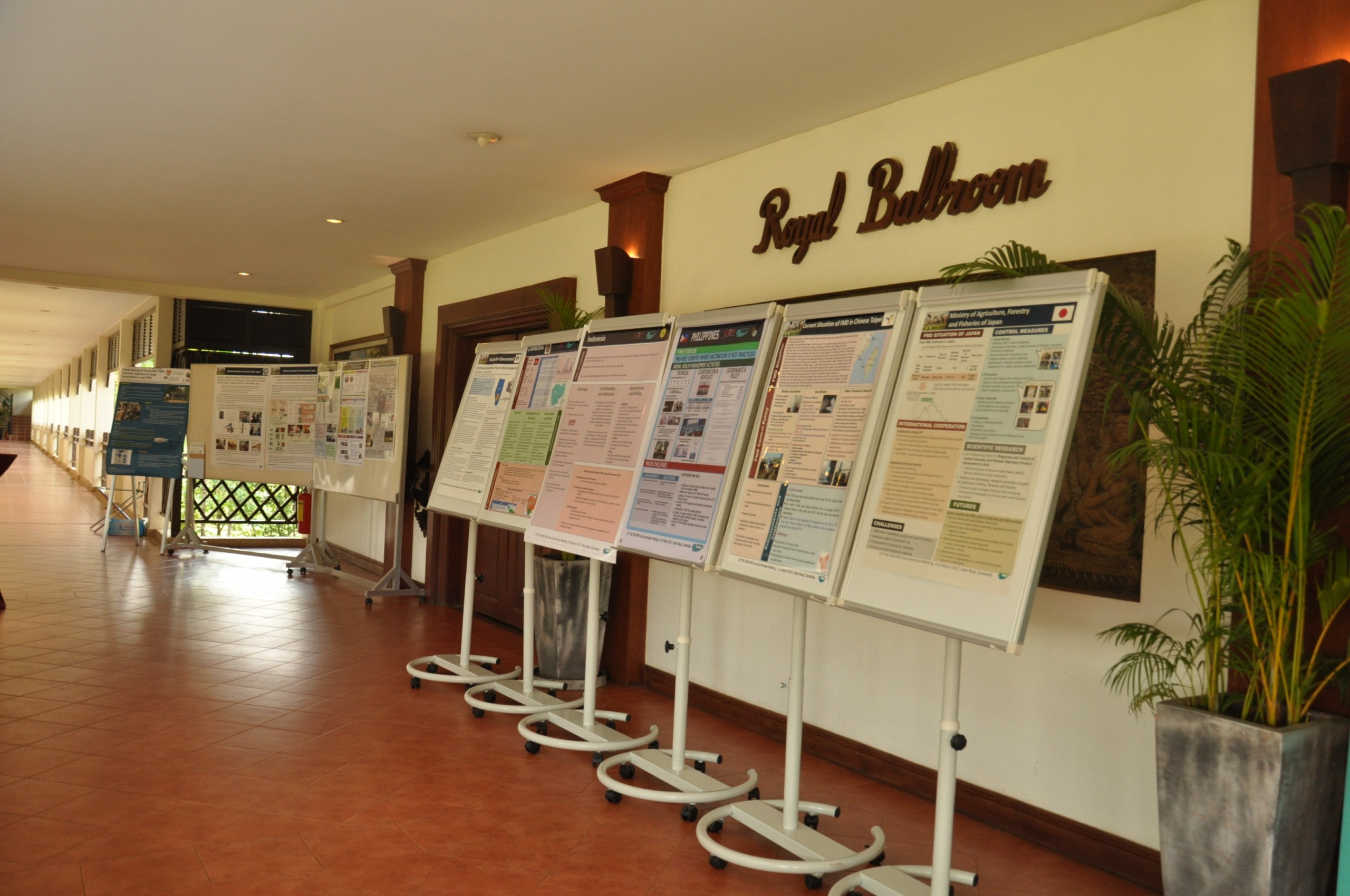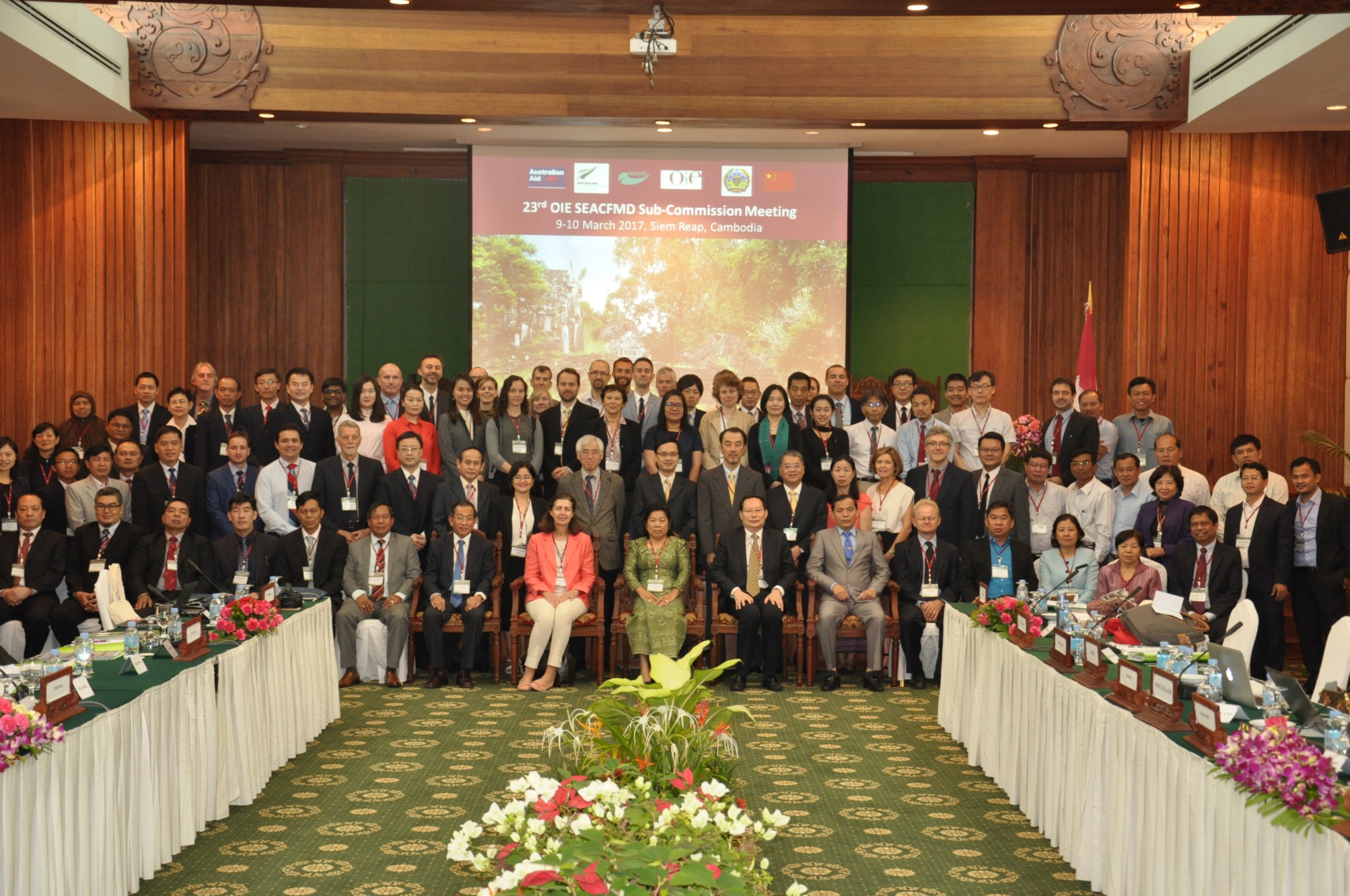The 23rd Meeting of the OIE Sub-Commission for FMD in South-East Asia and China was held in Siem Reap, Cambodia, on 9-10 March 2017. The event gathered around 90 participants, including OIE Delegates or their representatives of the 12 SEACFMD Member Countries and neighbouring countries/territories, OIE staff from Headquarters and the OIE Regional Representation for Asia and the Pacific and Sub-Regional Representation for South-East Asia, representatives of international organisations and private sectors, as well as FMD experts and observers.
The Opening Ceremony was honoured by the presence of, Dr Malin Hor, the Secretary of State Ministry of Agriculture, Forestry and Fisheries of Cambodia, Dr Sen Sovann, the Director General of Cambodia General Directorate of Animal Health and Production, Mr Pin Prakad, the Deputy Governor of Siem Reap, and Dr Zhongqiu Zhang, the President of the OIE Regional Commission for Asia, the Far East and Oceania. All addressed welcome messages and stressed the importance of FMD control in the SEACFMD region considering the substantial FMD susceptible animal populations and the critical role of livestock production for a growing human population.
In her Keynote Address, Dr Monique Éloit, OIE Director General, thanked Cambodia for hosting this meeting. She congratulated the SEACFMD Member Countries for their achievements in controlling FMD risks. Four out of twelve Member Countries have maintained FMD freedom without vaccination (Brunei, Indonesia, Philippines and Singapore), with one country having free-zone without vaccination (Malaysia) and three FMD endemic Member Countries have their National FMD Control Plan endorsed by the OIE (China, Mongolia and Thailand).
The meeting reviewed the requirements in the OIE Terrestrial Code and Manual that are relevant to FMD trade, vaccine and diagnostics. Updates on the latest global and regional FMD situation and challenges were discussed. The recent cross-regional transmissions of FMDV O/ME-SA/Ind-2001d were highlighted and Member Countries were requested to actively monitor the spread of this exotic virus strain and establish risk-based control and prevention measures.
Updates on the Campaign’s progress against the SEACFMD Roadmap milestones and selected case studies from Member Countries were presented to showcase the good practices and lessons learned in implementing the SEACFMD Roadmap, namely in the areas of cross-border animal movement control, FMD surveillance and outbreak investigation, vaccination and post-vaccination monitoring, as well as coordination, advocacy, policy and governance. The discussions underlined that further in-depth research is needed to understand and predict the epidemiological patterns of FMDVs and to improve vaccine selection. Better diagnostic methods and especially better vaccines are needed to significantly facilitate FMD control in endemic countries. In particular, vaccines with a longer duration of immunity are highly desirable given the difficulty in implementing repeated vaccinations in resource-limited countries.
On the second day, FMD relevant activities from OIE and FAO Regional Representations for Asia and the Pacific, as well as industry reports from vaccine manufacturers were presented. Other key partners, including OIE Regional Reference Laboratories for FMD, Veterinary Authorities of neighboring countries/territories, and research institutes, shared their recent developments in FMD research or control through poster presentations. Moreover, Dr Francisco D’Alessio, representative of SENASA, shared their successful experience of South America in the FMD eradication, notably the importance of a regional governance and coordination mechanism and veterinary service capacity building, a tailored regional surveillance and mass vaccination strategy, as well as sustained political and financial commitment of Member Countries and the strong private-public partnerships.
The meeting endorsed the evaluation outcomes of applicant countries for their FMD Progressive Control Pathway (PCP-FMD) status, namely Cambodia, Lao PDR and Myanmar retain their Stage 1 status, and Malaysia and Vietnam remain at Stage 3. The importance of a proper risk assessment in Stage 1 for the future success of the FMD programme was highlighted. It was recommended that countries at PCP Stage 1 need to assess the FMD situation and impact at national level more accurately, and countries completing PCP Stage 1 should consolidate their national plans and to base the control measures on the risks identified in Stage 1.
In the end of the meeting, the SEACFMD campaign priorities and action plan for 2017/2018 were reviewed. The meeting concluded with key recommendations which will serve as a guideline for the SEACFMD Campaign’s work in the following year. The discussions were fruitful and the recommendations will be submitted to the OIE World Assembly in May 2017 for endorsement.

